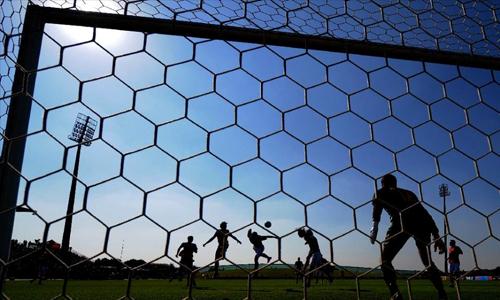Alleged global match-fixer freed in Singapore
A Singaporean accused of leading the world's largest football match-fixing syndicate was freed on Wednesday after a surprise court ruling seen as a blow to efforts to rid global sport of corruption.
Businessman Dan Tan, who was arrested in September 2013 but never tried, was released after the Court of Appeal ruled that it was "unlawful" to keep him detained because he did not pose a danger to public safety in Singapore.
The ministry of home affairs, under heavy international pressure, had invoked a special anti-gangster law against Tan after it became difficult to find enough evidence and witnesses to file criminal charges.
The three-judge court, Singapore's highest legal authority, said that while match-fixing was "reprehensible and should not be condoned", the alleged acts "all took place beyond our shores" and no evidence was presented to show that potential witnesses were being intimidated.
Tan, 51, a slight man with a shaved head, boarded a taxi outside the Supreme Court after his release without speaking to reporters.
"My client is relieved and grateful to the court for having come to this fair conclusion," his lawyer Hamidul Haq told the Straits Times newspaper.
Chris Eaton, the Qatar-based executive director for sport integrity of the International Center for Sport Security, criticised the ruling and urged Singapore to update its laws.
"This is the sort of attitude that turned the world of sport into roundly criticising Singapore as hypocritical by not showing good global citizenship in the first place," he told AFP.
"The government finally reacted and now just as Singapore is being congratulated for leadership in saving sport competition from corruption, its own courts have put the country back in the firing line."
"If your law doesn't fit a modern world, fix it now so it does, just like Dan Tan fixed football matches," Eaton said.
The Attorney-General's Chambers, which handles prosecutions of criminal cases, told AFP it "will study carefully the Court of Appeal's written grounds of decision before determining any course of action".
Persistent allegations that affluent Singapore is a major hub for match-fixing have stained its reputation as one of the world's least corrupt nations.
Singaporean Rajendran R. Kurusamy was sentenced to four years in jail in September for conspiring to rig a Malaysia-East Timor match at the Southeast Asian Games in Singapore in May.
In July 2014, Singaporean nightclub owner Eric Ding was jailed for three years for providing prostitutes to three visiting Lebanese referees in an attempt to fix future matches.
After Tan's arrest, the then-Interpol chief Ronald Noble said the Singapore-based ring was the world's "largest and most aggressive match-fixing syndicate, with tentacles reaching every continent".
Police say global match-fixing generates billions of dollars a year in revenues, fuelled in part by the popularity of online betting on match results and more minor game statistics.
In a book about Singapore's deep links with global match-fixing, local investigative journalist Zaihan Mohamed Yusof said authorities swooped on Tan's gang after uncovering plans to rig qualifiers for the 2014 World Cup in Brazil.
Experts have said that easy international transport, a passport accepted around the world and fluency in English and Mandarin have helped Singaporean fixers spread their influence abroad with the support of external investors, most believed to be from China.
Tan first came to prominence when fixer Wilson Raj Perumal, also a Singaporean, was arrested and jailed in Finland in 2011 for fixing top-tier games there.
Perumal, now assisting match-fixing investigators in Hungary, had told prosecutors he was a double-crossed associate of Tan.
Photo Caption: Police say global football match-fixing generates billions of dollars a year in revenues, fuelled in part by the popularity of online betting on match results and more minute game statistics (AFP Photo/Patrick Hertzog)
Related Posts

